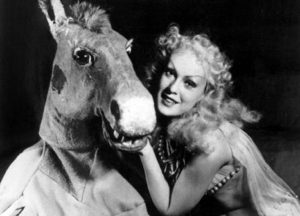 SPOILERS ABOUND! IF YOU’RE NOT CAUGHT UP, DO NOT READ!
SPOILERS ABOUND! IF YOU’RE NOT CAUGHT UP, DO NOT READ!
Hurray! Less sex and violence!
You don’t hear that very often. But we finally get an episode that doesn’t have gratuitous people running around naked, and instead focuses on the Shakespeare. There’s a little violence, sure, but nothing like what we’ve seen before.
Last week ended with Presto setting the theatre on fire after his sister died. At first this just made me hate him even more, because I don’t care how angry he is, why is he taking it out on them? What did they do? But this week we actually get some closure on that, as he confides in Shakespeare that he was intending to just stay there and kill himself, but couldn’t go through with it.
The plot, admittedly, is a little thin. The theatre was already in financial trouble, and now that it’s half burned to the ground, Burbage sees no choice to but to sell. Shakespeare, meanwhile, has a plan. He goes straight to Emilia Bassano, our Dark Lady.
I like this character. Not only is she smart enough to see through Burbage a few weeks ago and say, “I want to talk to whoever actually wrote this sonnet,” but two seconds after meeting Alice Burbage she says, “Oh, that’s who you wrote that sonnet for.” She’s very smart. But she doesn’t come across as an emasculating presence like so often happens in these situations, where the men end up like clowns who can’t figure out the solution to a problem and need the woman to come to the rescue. In fact she informs him that she doesn’t have any money of her own to help him, so he can forget that idea.
However, while she doesn’t have any money of her own, her friends do. We meet a new character (whose name I literally cannot remember and who is not listed in the IMDB page) who requests a special performance so he can win the hand of his lady. The play? A Midsummer Night’s Dream.
<Yay!>
Against the backdrop of the most recognizable play they’ve done this far, the characters all fall into place. Shakespeare wanders around trying to think of great things to say about love. Emilia feeds him ideas, without just writing it for him. Young Burbage complains that he has to play a fairy and has to have his ego stroked by Moll, who is madly in love with him but he doesn’t see it. Kemp gets to act his ass off as Bottom. See what I did there? 🙂
The rest resolves as expected, a little too easily – cut to Burbage about to hand over the keys to his competitor, only to have Shakespeare and the gang burst onto the scene, tossing a bag of coins up on the stage to complete the transaction. Because this is movie economics, that one transaction generated the exact amount of money that Burbage needed. Nobody ever seems to ask for more, you know, for cushion. They still have expenses the next day too, you know.
Should we check in with Marlowe? I need his story to get a little better. He enlists the aid of his dark friends again because he wants to see the devil. I find this ridiculous. The major plotline of this show is that to be a Catholic is punishable by imprisonment and torture, and there’s a small army raiding houses all over town looking for any kind of evidence. But Marlowe walks up to a guy and says, “Show me the devil” and the next thing you know they’re having a pagan sacrifice. Sure, why not?
This, of course, leads to the obligatory “sell my soul” reference which gives him the idea for Dr. Faustus. Ok. Keep it moving. Once upon a time this was supposed to be about some sort of competition between Marlowe and Shakespeare for who is the greatest playwright, and Marlowe’s written nothing for all seven episodes of the show.
There’s the usual advancement of story with the other characters as well – Southwell’s printing house is raided, but he takes Alice to a baptism. Presto tries killing Topcliffe again but Shakespeare saves him, again. Apparently they’re finally friends now.
I liked a lot about this episode – mostly because it was about Shakespeare and crew and not about random sex and violence. But I hate that it wrapped up so nicely. Bardfilm is the one that called it a Deux Ex Machina, but I think he’s right. “We need money.” “Hey, here’s this new guy that’s willing to give us the money we need.” “Let’s put on a show!” It’s like the plot device of every sitcom in the 1970s.
Everything feels like it’s building toward something, which is good. I guess they’ve got 10 episodes. I’m wondering how far we get, and what resolves and what’s left open. Mostly I’m wondering if the series will do well enough to merit a season two. I even told my wife the other night, “I have to go watch my Shakespeare show. In all the years you’ve known me when have I been able to say that? Shakespeare is on tv every week. That is so many kinds of awesome.” I don’t want it to end.
